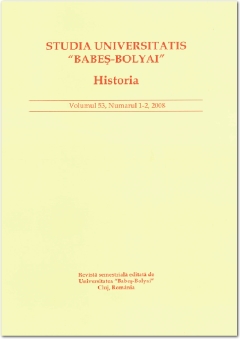Politica religioasă a principilor reformati
The Religious Policy of the Reformed Princes
Author(s): Edit SzegediSubject(s): History
Published by: Studia Universitatis Babes-Bolyai
Keywords: Confessionalization; Religious Policy; Transylvania; Early Modern Epoch; Central and Eastern Europe.
Summary/Abstract: The Religious Policy of the Reformed Princes The study contends that the Reformed princes played a fundamental role in the religious policy of Transylvania, but also that their importance is related to their partial success or, in other words, to their failure. The question regarding the presence of a state-driven confessionalization during the time of the Principality cannot receive a clear-cut answer: undoubtedly, some elements of a state-driven confessionalization did exist, but the political means required for its full implementation existed only in part. Just like the religious policy pursued by the Habsburgs in the 18th century— which had rather unexpected results, complicating rather than simplifying the denominational landscape—the religious policy of the Reformed princes failed to radically alter the religious structure of the country. The forced conversion of the Sabbatarians, the change of the denominational majority in Cluj following the introduction of confessional parity in the administration, the transfer of the Unitarian communities in the Trei Scaune region under the authority of the Reformed bishop, and the submission of the Unitarian Church did weaken Unitarianism, but this Church actually managed to survive and preserve its judicial status. The Lutheranization of the Saxon Church and the survival of the Unitarian Church revealed the limits of the religious policy of the princes. Consequently, the religious policy pursued by the Reformed princes was conditioned by the religious policy heritage of the 16th century. No matter how far the princes expanded their power, they were forced to cooperate with the Estates, rather than go against them. Just like their Western counterparts, the Transylvanian princes conducted their policies by taking into account the limitations and the possibilities offered by a position of authority.
Journal: Studia Universitatis Babes-Bolyai - Historia
- Issue Year: 53/2008
- Issue No: 1-2
- Page Range: 76-99
- Page Count: 24
- Language: Romanian

